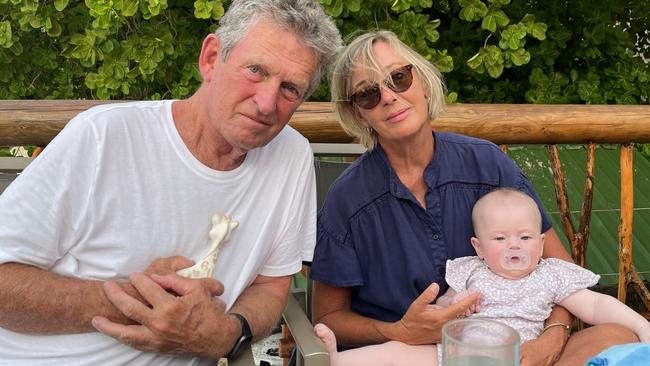Should wives get a slice of husband’s future earnings?
Retired barrister Tom Kirk KC raises tricky questions about fairness (and even pets) in his new guide to separation and divorce.

The title? 50% of All Marriages Fail (?).
He added the question mark because the 50 per cent figure is a bit of a myth. Also, it only really matters if yours is one of them, doesn’t it? In any case, he also added a rather cheeky subtitle: An Ideal Wedding Present.
He can be quite wry, can Kirk.
The book is dedicated to his “wonderful wife Wendy”.
“She is the love of my life,” he says in an interview with Inquirer. She is also, for the record, a former client, meaning he acted for her when she was getting divorced.
“In case it is thought that it was unethical for me to marry a former client, the relationship occurred some eight years after I acted for her, so I was fairly safe,” he says.
He wrote the book with Wendy in mind because when she separated, “she had three little children, and she looked around for a book to guide her through the process, and could not find one. This is now that book. It is mainly for women, but for all those who think that divorce may be on the horizon. Because you often get at least six months’ notice, don’t you?”
Kirk has some personal experience on which to draw in this regard. Born in Brisbane in 1944, he was reared at Toowoomba in Queensland’s Darling Downs region, educated at local state schools and worked for a time as a postal boy before becoming a barrister in 1974, which was also the year he got married for the first time.
“We divorced, then I married her again in 1992 (slow learner, hey?),” he writes. “Our second marriage only lasted two years.”
He took silk in 1994, met Wendy in 1995 and “some years later, she became my life partner. We are most happily married” and there are plenty of children and grandchildren.
The often amusing practical advice Kirk gives in his book is enhanced by Wendy’s contribution, “which is mainly around emotion”. Kirk advises future litigants:
● Not to leave the matrimonial home unless there is domestic violence or other abuse.
● To spend some time finding good counsel.
● To figure out how they are going to support themselves while slugging things out in court, and secure those funds “so your partner can’t access (them)”.
● Copy all financial documents.
● If your partner’s parents are wealthy, ensure you take notes of what they have said about inheritance because you may be entitled to some of it even before they are dead.

He also warns people not to try to hide funds from their spouse because it’s against the law to do so, and he gives an example of how it might go wrong: “In a case in which I was involved, the male partner, my client, without my knowledge, hid several thousands of dollars with a mate. Some years later, I happened to run into my former client at a function (and) he told me that when he sought the return of the funds, his mate’s response was: what funds?”
He looks at the impact of inheritance, lottery wins and the Bank of Mum and Dad on the possible settlement, the tricky matter of who brings what with them to the altar, and pet ownership. “The other day my married daughter told me she purchased a second dog to keep her other dog company during the day,” he writes. “Such is her devotion to both dogs, her husband (who is also devoted to the dogs) posed the question: who would get to keep the dogs if they separated?
“My daughter responded: ‘Me, of course’.”
But of course her husband wanted them, too. “The discussion concluded with both parties agreeing there would be no separation,” he writes.
Should you find yourself in a row over Rover, he says the court will regard the dogs as property. The court will look at who purchased the pet, who paid the vet bills, who was the registered owner and so on.
There are plenty of (anonymised) case studies tackling other tricky issues, too.
The most controversial chapter is likely to be the one titled: Can I get a share of my husband’s high future earnings?
The answer is mostly no, and Kirk says that is a failure of legislation. He says the less-qualified spouse (usually the wife) should be able to claim part of her former husband’s future income.
“It happens in the US, in the UK, all around the world,” he argues. The mother in any relationship tends to make the greater sacrifice, “to the detriment of her career”. She has to carry the children, and feed and care for them after birth; she is also likely to do more parenting.
“Often a future breadwinner (let’s call this person ‘him’) meets his future wife (who has excellent employment prospects)” when they are quite young, he writes.
They marry, and the man may then take up an overseas posting or do an MBA, and “she tags along, often with a child or children limiting her prospects”.
He becomes successful and starts to earn a lot of money. They get divorced and, while they may have amassed assets, the husband can go on and earn a high income while her prospects are likely more limited.
She is “handicapped so far as her own earning capacity is concerned”, he writes.
He cites a case in which he was involved, “where the parties were aged in their mid-40s, having married in 1991, moved overseas in 1994 (for his career) and had three children” before they divorced.
The husband had become an equity partner in an international firm and was earning $3m a year in a “low-tax country” and they had a $7m property pool. The wife wanted, but did not get, 25 per cent of the husband’s after-tax earnings for a decade. Instead she got 70 per cent of the property pool (meaning he got $2.1m and she got $4.9m). Kirk argues that’s unfair because the husband would “retain his massive earning capacity” into the future, while she would have to start from scratch.
Kirk looks at the different outcome in a British case in which the former wife of a highly paid Arsenal football player received almost $500m indefinitely (reduced to four years on appeal).
He says “the unfairness” of the Australian situation “is obvious”. He accepts that “around 90 per cent” of high earners – barristers and judges among them – would likely disagree.
As a high earner himself, “I personally wouldn’t have liked such a ruling”, he says, “but that doesn’t make it fair. And it is mostly the wives who suffer.”
The Full Court of the Family Court has said “the most valuable asset which a party can take out of the marriage” is future earning capacity. To pluck an example at random, a barrister would take his practising certificate with him, but it is not property and the wife can’t take part of what he earns using it.
“I urge any politician who reads this section of my book to have the Federal Attorney amend the Family Law Act so it corrects the problem,” Kirk writes.
On a less formal note, Kirk says he saw many thousands of clients across his decades in practice, “and some of them have not only brought their financial matters into my chambers but have also felt the need to bring in their personal stories.
“While I provided a box of tissues if needed, I reminded them they were there to see me about ‘the bucket of money in the middle of the table’,” he writes.
He urges them to pay attention to proceedings since the settlement is likely to be “the most important (financial) decision you’ll ever make”.
He has seen property settlements “fall apart over a set of saucepans or a photo album … (when) funds would be better off spent on a trip to David Jones where you can purchase items for your new start”.
Finally, Kirk advises clients to grieve the loss of the marriage and remember that new beginnings are possible.
“Remember also that you are in control of your own happiness, moving forward,” he writes. Divorce is not a failure, “it’s a life experience” (and yes, his wife helped him with that bit).
50% of All Marriages Fail (?): An Ideal Wedding Present by Tom Kirk KC is available on Amazon. (Readers should still get independent legal advice, obviously.)






Tom Kirk KC retired in 2023. He wasn’t yet 80, liked to be busy and was worried he might get bored. He had friends who had taken up piano or learnt a second language in their retirement. He decided to write a book based on his experience in the Family Court.